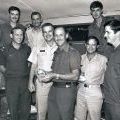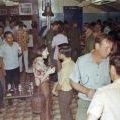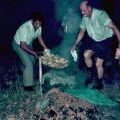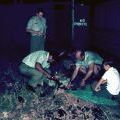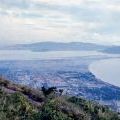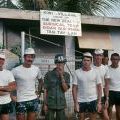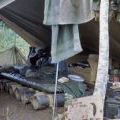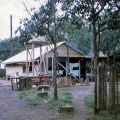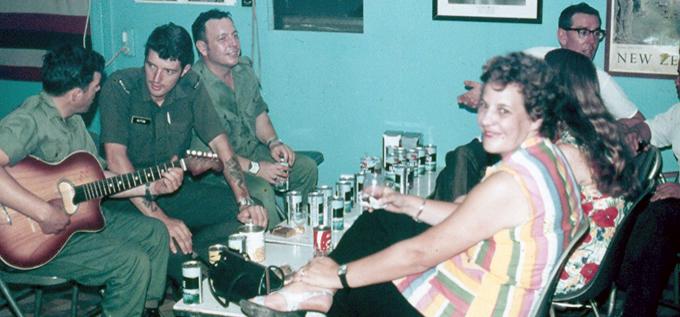
New Zealand servicemen and civilians relax inside the Kiwi Club in Saigon, circa 1971 (Martin Thompson)
In Vietnam, New Zealand infantrymen and gunners spent a much higher proportion of their time on operations than soldiers in previous wars did. In the first half of 1967, members of V Company and 161 Battery spent more than 80 per cent of their time in the field, with little time dedicated to rest and recreation. [1] Most downtime between operations was spent inside the wire on base, a chance for men to rest and recuperate without civilian contact. While men were relatively secure ‘at home’, the constant shadow of possible attack meant staying on edge, even off-duty, with perimeter patrols part of the ‘at rest’ routine. For most, rest and recreation in country meant a few hours enjoying a concert at Luscombe Bowl or a few days in nearby Vung Tau shopping, indulging in the local bar scene, or socialising at allied service clubs. Most received a leave and accommodation pass for rest and recuperation out-of-country, perhaps in Thailand, Japan, Taiwan, Hong Kong, the Philippines or Singapore. Very few regular soldiers returned home to New Zealand on leave. [2]
Off duty, in country
Vung Tau was party central for New Zealanders off-duty in South Vietnam. Whether pursuing the company of Vietnamese bar girls, or dinner and dancing at an upmarket hotel, Vung Tau catered to all tastes. Red Cross welfare officer Avis Wilkes recalls: “There was the Grand Hotel… it served beautiful food and we used to go quite often. There would be absolutely abominable music with Vietnamese girls singing, and (music) of the day, like Leaving on a Jet Plane.” The Peter Badcoe Club also provided a range of recreational amenities – including a swimming pool – for Australian and New Zealand soldiers on leave. In Saigon, an after-hours bar was set up within the Free World Military Assistance Office compound to cater for allied personnel. Air-conditioned and equipped with a well-stocked fridge, the club was a popular place for socialising amongst the 60 staff of V Force HQ. Some members of V Company took brief respite on US Coast Guard Patrol Boats operating out of Cat Lo on the northern Vung Tau Peninsula, or on US warships off the coast. [3]
Showbands and songbirds
Concerts at Nui Dat’s Luscombe Bowl were a social highlight for New Zealand and Australian troops in Vietnam. Most entertainers passing through South Vietnam were Australian, such as the teen singing star Little Pattie, whose 1966 tour coincided with the Battle of Long Tan. A few New Zealand entertainers also entertained ANZAC troops. Kiwi showbands visiting in 1969 included the Māori Volcanics and the Quin Tikis. Dinah Lee also made two trips to South Vietnam. In October 1969, a party of 19 1RNZIR musicians led by Lieutenant James (Jim) Carson left for six-day tour of South Vietnam. Hailed as ‘the best darn Dixieland band in Sth East Asia’, the New Zealand musicians spent a whirlwind five days performing in Saigon and the Phuoc Tuy province, with a schedule that included a television appearance and concerts for Kiwi troops at the Luscombe Bowl and FSB Discovery. [4]
Overseas leave
Bangkok, Hong Kong, Japan, and Singapore were common destinations for personnel granted R&R leave outside of Vietnam. For some, it was a chance for sightseeing, cutting loose, or simply relaxing away from the shadows and sounds of war. For married men, leave out of country was a chance to spend precious time with families lodged in the 28th Commonwealth Brigade digs near Terendak Camp, Malaysia. John ‘Doc’ Mountain found his fortnight’s leave with wife Mary and young children an unsettling experience. “That first week took a little bit of getting used to, but the second week was good. I got out and ate some really good food, wandered around Singapore. Landing back in Nui Dat it was like I hadn’t been away. In some ways I wished I’d not gone because I missed them more.” [5]
[1] Ian McGibbon, New Zealand’s Vietnam War, Exisle, Auckland, 2010, p. 277 [2] McGibbon, p. 245 [3] McGibbon, p. 293 [4] VietnamWar.govt.nz, 2008, 'The Best Darn Dixieland Band in South East Asia – 1RNZIR Band Tour', URL: http://www.vietnamwar.govt.nz/memory/1rnzir-band-tour, accessed 13 April 2013 [5] John ‘Doc’ Mountain, interview – Vietnam War Oral History Project, 28 June 2008, Alexander Turnbull Library Oral History and Sound collection, Wellington, OHInt-0959-14

